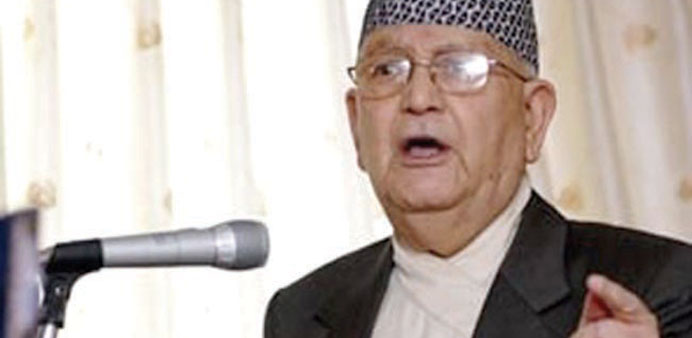IANS/Kathmandu/Gurgaon
Battling cancer, former Nepalese prime minister Surya Bahadur Thapa died late Wednesday night in a hospital near Delhi, doctors said. The Nepal government said the five-time PM will be accorded state honours and national mourning will be observed today, the day of his funeral.
The 87-year-old Thapa lost his battle to cancer at Medanta - The Medicity hospital in Gurgaon, near Delhi, late Wednesday night, a doctor said yesterday. He was admitted to the hospital on March 29 and “his stomach, liver, pancreas, oesophagus and intestines were affected”, a doctor told IANS.
“Thapa was admitted to the intensive care unit. He breathed his last around 11pm on Wednesday. We handed over Thapa’s body to his brother-in-law Sanjay Bahadur Thapa at 11.20am yesterday,” the doctor said.
Thapa’s family members arrived at the hospital yesterday and family sources said the body would be taken to Kathmandu where it will be kept at his Maligaon residence in Kathmandu prior to the last rites scheduled for today.
Today morning, the body will be kept at the party office of Thapa’s Rastriya Prajatantra Party (RPP) for paying of last tributes to the departed leader. The body will then be taken to Dasharath Stadium for the public to pay their final tributes.
The body of the late RPP leader will be taken to Pashupati Aryaghat on the banks of Bagmati river where the final rites will be performed with state honours, RPP general secretary Deepak Bohara told media persons in Kathmandu.
National mourning has been ordered on Friday and the national flag will be flown at half-mast on the day in Nepal and at Nepali diplomatic missions abroad, an official spokesperson said in Kathmandu.
Thapa served as Nepal prime minister on five occasions (1963-64, 1965-69, 1979-83, 1997-98 and 2003-04), under three kings in a political career spanning almost six decades.
His only son Sunil Bahadur Thapa is minister for commerce and supplies in the incumbent Sushil Koirala-led government.
A democrat even under a monarchy and a relentless crusader for the upliftment of the deprived sections of the Nepali feudal society, Surya Bahadur Thapa never yearned for power -- yet he graced the office of prime minister of the Himalayan nation for an enviable five times, a record equalled only by Nepali Congress strongman Girija Prasad Koirala.
Thapa was born on March 21, 1928 into a big landowner family -- yet during his almost six-decade-long political career, he worked untiringly for the upliftment of those sections of the traditionally feudal Nepali society which had remained neglected.
He was instrumental in abolishing the Birta land-system (wherein rent-free lands were held by the erstwhile powerful Ranas and their sycophants to whom these lands had been given away generations ago as reward for their loyalty) and setting strategies to promote land reform by consolidating tenancy rights of the tenants.
He was also responsible for bringing the “Muluki-Ain” — national laws — through which he attempted to eradicate the practice of an “untouchable class” and strengthen women’s rights to vote and other social rights and activities. In this regard, he promulgated laws to protect the fundamental rights of the citizens of Nepal.
Thapa was able to do all this and more because he graced the office of the country’s prime minister a record five times: Twice under the “Builder of Nepal” King Mahendra, the same number under his son King Birendra — the democratic monarch — and the fifth and final time under King Gyanendra — whose reign sounded the death knell for Nepal’s 240-year-old monarchy in 2008.
Thapa’s first stint as the leader of government under Mahendra was brief — barely two months from December 23, 1963, to February 26, 1964 — but his second innings lasted longer— from January 26, 1965 to April 7, 1969 — and was more fruitful. He expanded the coverage of the country’s partyless Panchayat
constitution of 1962 and promulgated an amendment to make it “people-oriented”.
King Birendra, who acceeded to Nepal’s throne in January 1972 following the death of his father Mahendra, ordered Thapa’s arrest in October and put him in Kathmandu’s infamous Nakkhu jail when the stormy petrel demanded major political reforms in the country, including democratic changes in the constitution and restoring rights to the people with free and fair elections.
However, the same King Birendra was to anoint Thapa as his prime minister less than seven years later in May 1979. Thapa remained in the job till July 1983.

Surya Bahadur Thapa
